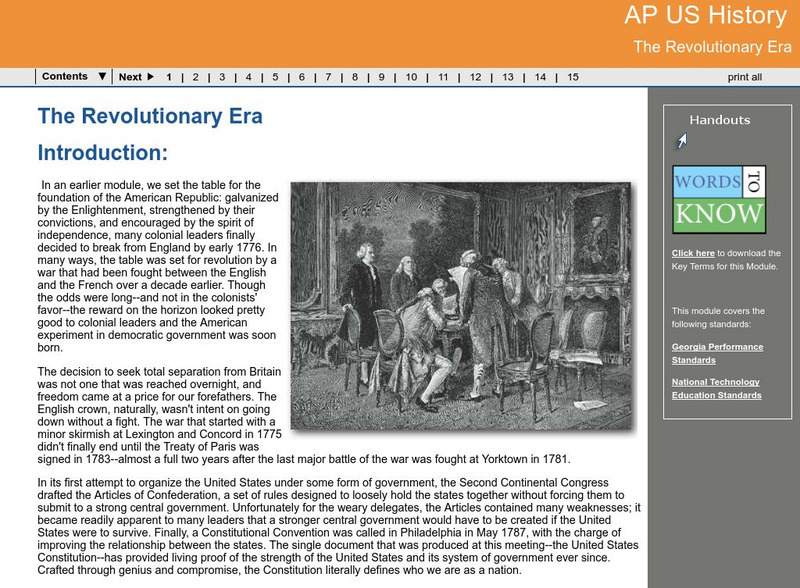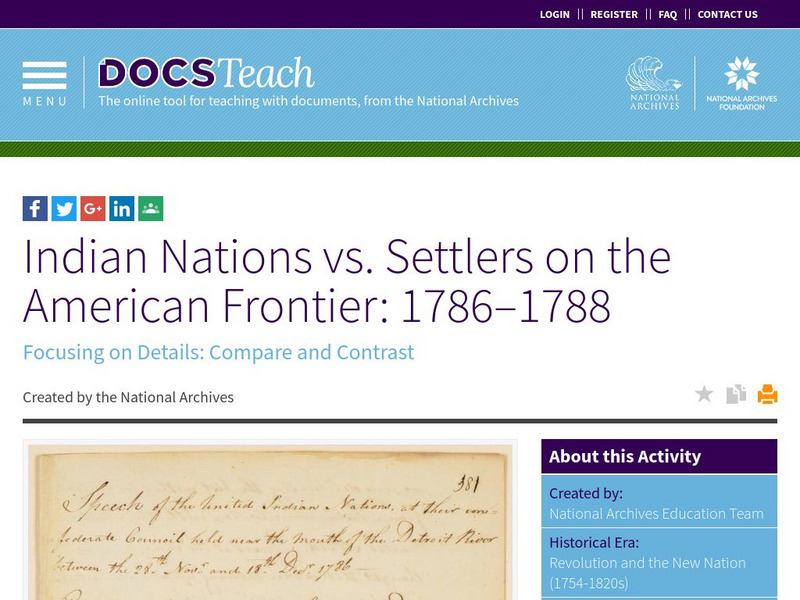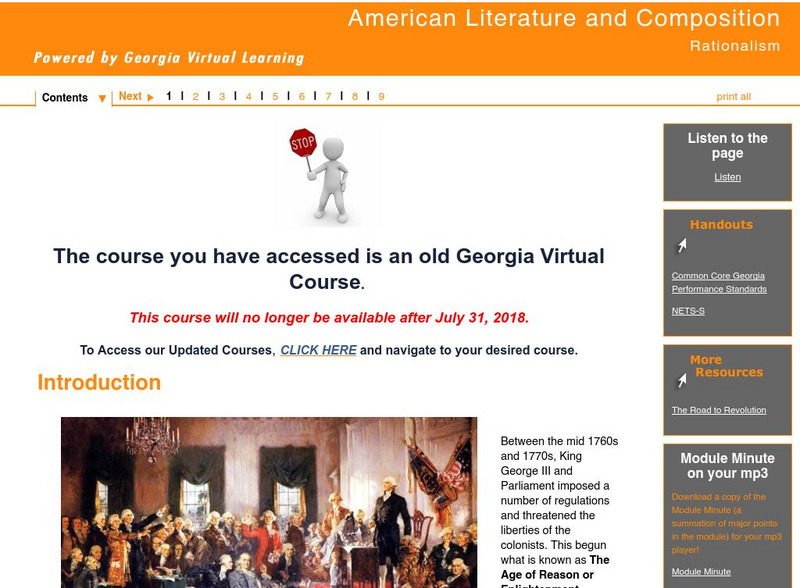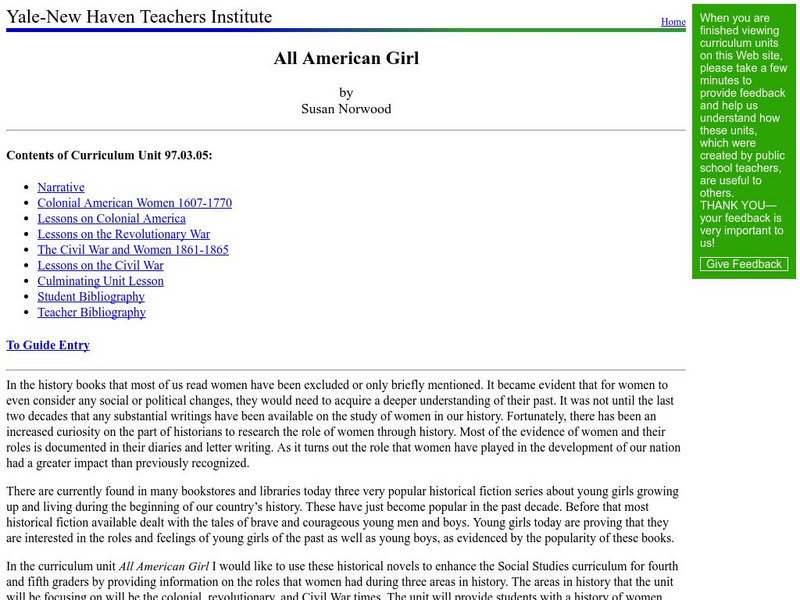Hi, what do you want to do?
Curated OER
Graphing the Past Using Today's Technology
Eighth graders research and gather information from such sources as Microsoft Encarta, World Wide Web sites, and other sources using computer software to collect data.
Curated OER
Revolution, Revolution
In this revolutions worksheet, students use a set of song lyrics, follow along with the song "Revolution, Revolution," then use a word bank to answer a set of 5 questions and fill in correct answers to 7 additional questions. No song...
Curated OER
Celebrating African Americans and Coins
Students examine the Booker T. Washington commemorative coin and listen to a biography of Washington's life. They develop a list of reasons why his life was commemorated with a coin. They examine other coins and the lives and work of...
Curated OER
American Revolution
Students review the events leading to the American Revolution and the Declaration of Independence. Using the internet, they examine many different political cartoons from the time period and discuss the political atmosphere. In groups,...
Curated OER
A Brief History of Fairfax County
Middle schoolers begin the lesson by writing what they know about Fairfax County in their journals. Using primary source documents, they identify ten interesting facts about the area and watch a video. They complete a Venn Diagram...
Curated OER
Defining Terrorism
Learners explore the debate over legitimate and illegitimate uses of force and differentiate between terrorists and freedom fighters. They read articles, participate in class discussion and write an essay with their observations.
Curated OER
Benjamin Franklin
In this early American history activity, students respond to 9 essay and short answer questions about the life and accomplishments of Benjamin Franklin.
Curated OER
The Monroe Doctrine: U.S. Foreign Affairs (circa 1782-1823) and James Monroe
Learners read the test of the Monroe Doctrine then list the key points and discuss its central tenets.
Curated OER
Good Brother, Bad Brother
Students are exposed to the writings of John Wilkes Booth. They discover that fanaticism is not just a modern phenomenon. They examine four periods in American history when treason was at issue.
Alabama Learning Exchange
Alex: Revolutionary War, Research, and Technology
During this social studies lesson, students conduct research on specified topics related to the Revolutionary War. The lesson should be used at the culmination of a unit of study on the American Revolution. Students will use word...
Georgia Department of Education
Ga Virtual Learning: Ap Us History: The Revolutionary Era
AP U.S. History course unit on the Revolutionary Era, including the road to war and major political changes brought about. Comprehensive multi-media module.
US National Archives
National Archives: Indian Nations vs. Settlers on the American Frontier
When the Revolutionary War ended, there was an ongoing conflict between the Native Americans and American settler in the Northwest Territory. Students will study two documents from each side of the issue and answer questions and/or hold...
CommonLit
Common Lit: Text Sets: Founding the United States
This is a collection of 15 Grade-Leveled texts (5-12) on the topic The Founding of America. Once the Revolutionary War was over, America's Founding Fathers had to develop a nation. Learn about the founding of American democracy, from the...
Georgia Department of Education
Ga Virtual Learning: American Literature and Composition: Rationalism
This is an introduction to a unit on Rationalism, also known as The Age of Reason or Enlightenment, was set during the American Revolutionary period. It focuses on the belief that the power of reason and science would further human...
Lin and Don Donn
Lin and Don Donn: Lessons on the American Revolution
This site provides lesson plans and unit ideas for teaching about the American Revolution. Look for suggestions about specific people or the Revolutionary War in general.
Curated OER
National Park Service: Revolutionary War: Portraits: Ames Wilkinson
Portrait from the United States National Park Service Museum Collection on American General James Wilkinson is presented with a biographical sketch offered under the About the Man link. Learn about the portrait and the subject in this...
Digital History
Digital History: Impact of the Revolution
These four Digital History excerpts from primary source documents attest to the impact the Revolutionary War did (and did not) have upon society and the status of and attitudes toward women and slaves in the newly established United States.
A&E Television
History.com: Continental Congress
From 1774 to 1789, the Continental Congress served as the government of the 13 American colonies and later the United States. The First Continental Congress, which was comprised of delegates from the colonies, met in 1774 in reaction to...
Annenberg Foundation
Annenberg Learner: America's History in the Making: The New Nation
After the War of Independence, Americans were unable to agree on the form of their federal government. This unit explores how those conflicts played out as the new Republic defined its identity in relation to other nations.
A&E Television
History.com: The Mariel Boatlift: How Cold War Politics Drove Thousands of Cubans to Florida in 1980
After Fidel Castro loosened emigration policies, some 125,000 Cubans landed on U.S. shores over a span of five months. The Mariel Boatlift of 1980 was a mass emigration of Cubans to the United States. The exodus was driven by a stagnant...
Yale University
Yale New Haven Teachers Institute: All American Girl
This lesson plan on Abigail Adams, Phillis Wheatley and other women writers is designed to "enhance the Social Studies curriculum for fourth and fifth graders by providing information on the roles that women had during three areas in...
EL Education
El Education: Creation of a Nation
This script of a play was created by 4th grade students at the Genesee Community Charter School in Rochester, New York, as part of a learning expedition on the Revolutionary War and the birth of the United States. Students wrote,...
A&E Television
History.com: What Did the Three Continental Congresses Do?
During the Revolutionary War, the Continental Congress became America's de facto government. Over a period of 15 years, from 1774 to 1789, the Continental Congress underwent a profound evolution. Starting out as a temporary group that...
The Guardian
Guardian: Colombia's Halting Progress on Human Rights
Guardian correspondent Kimberly Stanton discusses human rights abuses occurring in Colombia and the attempts of Colombian President Juan Manuel Santos to distance himself and his government from them. (June 5, 2011)
























